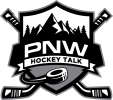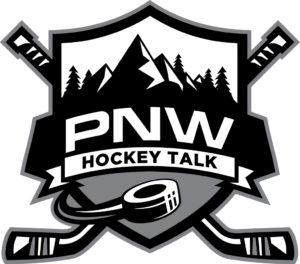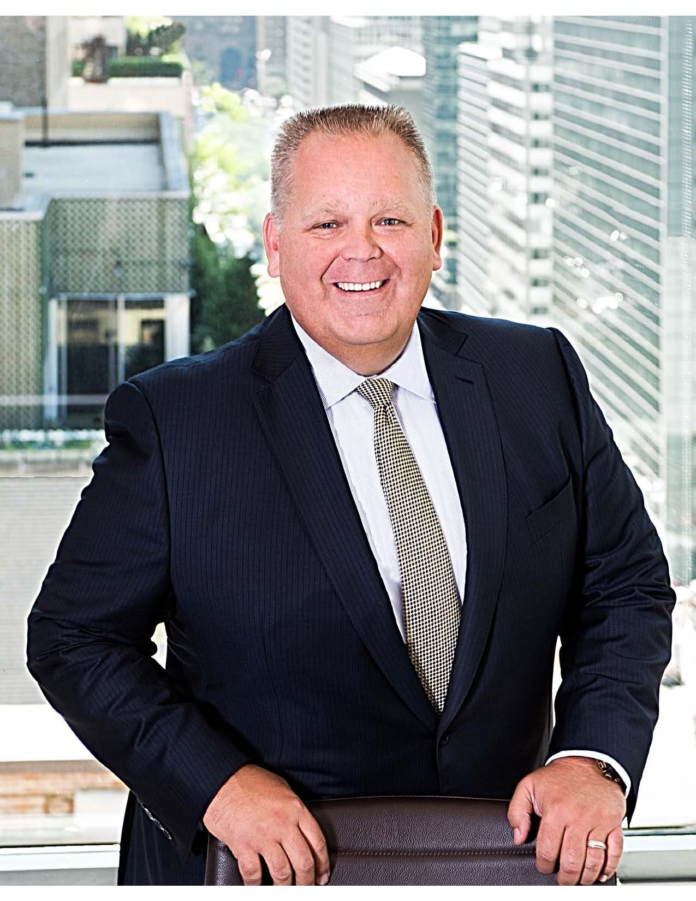
Recently I had the opportunity to sit down for a one-on-one conversation with Portland Winterhawks owner and managing partner Michael Kramer.
While Kramer may be a founding partner and CEO of an investment firm in New York City, one of the new Winterhawks owners is passionate about the team he formally acquired on December 31, 2020.
Throughout my conversation, I could see the passion he has for the franchise and many times mentioned how he never missed a game. If he could not be at the Veterans Memorial Coliseum in person or meet the team somewhere on the road, Kramer would watch the game on his computer or phone if necessary.
When it comes to speaking with owners, I prefer to provide the entire quote so fans can hear exactly how my question was answered. So this article will be slightly different from my normal articles as I will be providing in a Q&A format.
This article is long, so grab a cup of coffee, or your favorite beverage, and settle in. Break it into two reads if need be.
One thing is for certain, in the 16 months since Kramer officially took ownership, he is different from previous owners. While this is a business and he wants to make money, there is a pride in being associated with the franchise. He listens to the fans and is not afraid to be in the public spotlight.
How excited are you for the playoffs to officially get underway:
“This is something I’ve been looking forward to for weeks. Being on the other end of the country, I haven’t missed a game this year. I’ve literally been at or watched every single game. Playoffs have a totally different feel, and knowing we are in the playoffs, we believe we are in a position to make a good run. It is like being a kid again for me.
I’ve made that trip (to Prince George), so I can check that off my life list that I’ve been there. I’ve been to Spokane and a couple of others. The best part of this journey for me so far has been watching the boys go through it. I wanted to experience some of that with them. That is one thing about seeing the games here, but going and meeting with them on the road, and supporting them on the road, or having the after-the-game meal with them late at night after a game, those have been interesting. I got to go to a hotel, they got on a bus.”
How was the atmosphere in the VMC for you for your first playoff game:
“I’ve said it before, in the first year, our COVID-impacted year, one of the weirdest things I’ve ever experienced in my life is sitting in the VMC by myself watching a hockey game. It was a little eerie, a little weird, and I even questioned a lot about why we did what we did at that point in time. That said, it has been exciting to see this build. Our first big night, as always, was being at the Teddy Bear Toss. I was here and got to see the energy. I literally have watched every single game and have watched the crowds grow and grow. Part of the excitement of the last month is that the crowds are starting to get back to what we’ve seen historically. We think there is a lot more room to grow. When I talk to the ticket guys, they tell me how many fans are here, and I tell them how many empty seats there are that we can still fill up.”
There has been a lot of change within the organization, but hardly any on the hockey operations side. Is that related to the winning culture of the Portland Winterhawks:
“It is more than the winning culture for me.
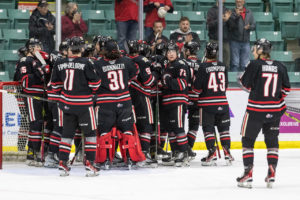
As I’ve said, the best part of this two year run for me, the most surprising part, is the ability to participate with these guys as they go through pursuing their dream. I don’t think people truly understand what these boys are going through. Every one of us grew up with some sort of dream. These guys are actually living and writing that dream right now. At the same time, they are doing it away from their homes, trying to grow up and go from young men to men, going to school.
While we haven’t made any changes to the hockey operations, we are going to support them that way. We are also going to support on the life issues and development. We feel a responsibility for them coming through us. You see Gabe Klassen being named Scholastic Player of the Year. What better life award can you get than that? We had a lot of other players receive awards or get to sign their NHL contracts. There are a lot of our players that are being looked at by pro teams with several getting drafted this year.
It is exciting and I feel honored to follow these guys through this and go forward with their lives. Even in my short tenure, I still talk with Seth Jarvis every once in a while. He came through New York and I saw him. I talked with Nick (Cicek) when he signed, so being able to follow up with that has been great.”
Where I have seen changes is in the front office. How do you feel that side of the business is operating:
“From a front office standpoint, that has been the biggest challenge that we’ve had in our times as owners.
The hockey operations, they just sort of rolled. We have Mike (Johnston), all the confidence in the world in Mike and Don (Hay) and Brian (Pellerin) and Lisa (Hollenbeck) and the rest of the team.
On the front office side, we’ve probably changed over, voluntarily or involuntarily, 90% of the staff since we’ve taken over. We lost a lot of history, a lot of knowledge, but we also opened up a lot of new ideas and excitement about it. We are really excited about the group of people that we have here today. We’re looking to add more people to help grow the front office, and what we want to try and do is, we want to earn our spot within the Portland community.
We don’t think that it is enough that we’ve been here 45 years and people have to support us. We know we have to get out there. Frankly, as an organization, we probably lost that over time. I think with the new group in the front office, that is a primary focus of ours. How do we reach out to earn our spot in the community?”
When you first took ownership of the team you mentioned wanting to grow the hockey community in Portland. How has that gone from your standpoint:
“It is still early. When we first got involved, you weren’t allowed to go into a skating rink. Now we have nominal restrictions. We’ve seen a big increase in terms of the number of people coming through on that side of it. There is a huge shortage of ice in this town and that is one of the biggest things that we talk about. One of the things we were able to do was work with the Moda Center and the folks over at the Trailblazers to actually open up the VMC ice on certain times. We were able to open it up to free skate, learn to skate programs, and open it up to hockey schools. We’ve actually had some tournaments here too as well. We are trying to build youth hockey as a whole.
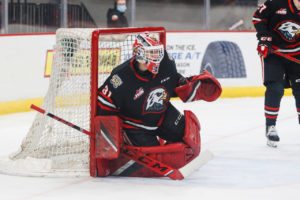
We clearly have a vested interest in the skating center in Beaverton. That is where our primary youth hockey goes through. We’ve reached out to the other programs that are out there. I’ve met with the folks in Sherwood and expressed that we are willing to help anyway that we can to help grow hockey out there any way we can.
We want to be involved in ‘try hockey for free’ programs, pride nights, women in sports, and all other different communities that are out there. We want this to be for everybody and we want to share with everybody. Going down to Bend was great. Are there other things we can be doing? Personally, we should be working on the Vancouver, Washington community. It is right here. Why aren’t we pushing our way across the river and out there? We are going to try to do a lot of different things that introduces hockey people and let people make the decision if they like it or not. I’m clearly biased, but it is the best spectator sport out there. It is hard to come to a game and not say I want to go back to another one. If we can open it and expose it to more and more people, it will be great for everyone involved.
We want to see that hockey community grow, so we have a very simple philosophy. ‘The more people playing, the more people watching, the more people enjoying hockey, the more enjoyable it is for everybody.’ I’m passionate.”
The Junior Winterhawks have had recent success on the national level. Since that organization was part of your acquisition when you bought the team, how excited does that make you:
“I absolutely love them and can’t wait for the day when we have a Portland born and raised kid playing here on the Winterhawks. I think that would be great for us and for the city. Again, the history of hockey in this town is incredible. I think we as an organization historically have not good a job of reminding people of that. Look back to the night we had earlier this year when we had the tribute night to the Buckaroos. We want to bring back some of that nostalgia from the Buckaroos days and other history. We had Buckaroos memorabilia out there, so we want to do more things like that.
The other thing that is really important is there is hockey out there that we don’t own or don’t control, and we are fine with that. We want to encourage those just as much. I’ve talked about the Rose City organization several times, the girls organization. I just think it is just the most wonderful thing out there. We have no interest in that except for the fact that they are doing great things and exposing hockey to girls. We will support that organization with whatever we can.”
Many fans are wondering if games will ever return to the Moda Center. I know the ice machine is an issue, but what is your stance on the Winterhawks playing games next door again:
“I’ve never seen a game at the Moda Center. Since I’ve been here, 100% of our games have been at the VMC. We would be very open to it, we do have a great relationship with the Moda Center. We are in constant contact with them about if there was an opportunity to have some games over there, I’m sure we would have that conversation.
In the interim, one of the challenges we found after taking ownership of this team is that we don’t control as much as we thought we did. We are just trying to deal with the things that we can control. What we can control today is making the VMC our home and making this our barn and that’s what we are going to do. Hopefully people have noticed some of the changes. We know there are still a lot of changes that need to be done. We hear the feedback, we are not deaf to it, but again, we can’t control some of it. Up in the concourse we were able to get some branding up there in the lower bowl. I think people are going to see some new things next year that will make this more like our arena. We are the anchor tenant here and this is our home. We can control some of that and are working with the Rose Garden to push some of the other things we want. If an opportunity opens up for the Moda Center, and if it makes sense for both of us, I’m sure we will do that. The ice issues are the biggest obstacles at this point.”
Portland fans have seen several previous owners who have taken a back-seat approach. How involved do you want to be with this team team and how hard is it to do so from New York:
“It is definitely easier if I don’t have to travel, but I do have other businesses here in Oregon. When we first thought about doing this we said we were going to have to be active and be involved. I try to get out to Portland once a month or so. That said, we’ve had video and zoom meetings every week where we get all the senior group together to talk through different things. We are talking about the next steps for the organization.
At the fan fest (before Game 2 against Prince George), someone came up to me and introduced themselves to me and asked if I was the new owner. I nervously said yes and was worried ‘Where is this going?’ It was a sad conversation for me because he said, ‘Thanks for coming out. The previous owner would have never been out here and done this.’ That was sad for me because my thought is, ‘Why wouldn’t you? Why wouldn’t you want to be out there and see the boys come in and get ready for a playoff game?’ I actually wouldn’t miss it.”
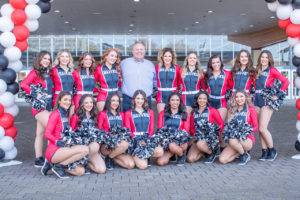
What are you most proud of in your short time of being Winterhawks owner:
“The thing I’m most proud of is the boys no question. What I frankly am most proud of is the system we’ve put in place both from a hockey and a life skills basis. We’ve continued to reinvest in that. WAHA for example, when we got involved, WAHA was bone dry, had no money, and wasn’t able to support the educational fund. We actually wrote checks ourselves to do that and get it back up and running. Being able to continue to participate in these boys development is so important. Every of one us had a dream at some point in time; some crazy, wild dream. We are going to do X, Y, or Z, and these boys are doing it. They are actually living out their dream, and are playing a professional style of hockey and are growing up at the same time and going to school at the same time. What often gets overlooked to is how involved they are in the community as well. We are really going to build on this and supporting them live that out.
I’m proud of the fact that we took a business, that’s what this is, that was bankrupt in the middle of a global pandemic and we’ve been able to rebuild an organization that we are excited about going forward. Our senior level people within the business side have come from all different backgrounds that we are excited about what they are going to do going forward.
I’m very excited about this summer.”
I’ve heard the phrase that you don’t like to be outhustled. How do you put that into practice:
“First let me say, the phrase is that ‘I will not be outhustled; we will not be outhustled.’
I think the big thing is that I believe the Winterhawks as an organization, given the legacy they have in this town, have sort of seated its position within the hearts of Portlanders and Oregoners and have become complacent. What does that mean? That means we are going to reach out to our fans, I’m always looking at social media and if a fan says they can’t get a hold of someone at the office. I’m sending that message to the office saying, ‘You need to call that person.’ If we know that we need to sell tickets, why aren’t we out in the community doing that? It is just about doing things.
A lot of what we hear is challenges with the building and they tie directly to the building. People may not know it, but it is connected there. We always hear about the complaints about the food. We get it, but we don’t have fryers or ovens or other appliances. The building says we can’t do anything, so what are we doing? Right before you got in here, I was meeting with the landlord to talk about how are we going to that done? What can we do to make progress on the food front? I’m having those conversations all the time. I’ve set some goals and I’m tenaciously going after them.”
What is the biggest challenge you’ve faced as the new owner:
“It is a fine balance among many things, but the building is our biggest issue we have. We have what I feel is one of the coolest buildings in the WHL, but it is also probably the oldest building. We are the only building that doesn’t have suites or fryers. We have a heap of parking challenges and other things like that. I didn’t realize a lot of those things before I came in and the way I would have to work through those would be with the Moda Center and the city of Portland. We don’t control that. I can’t just say, ‘Let’s reduce the price of parking.’ That isn’t my call, but what I can do is find the people who make those decisions and start to sit down with them and force them to have a conversation with me to get to a joint problem solving approach.
The really positive thing I can say is the folks at the Moda Center, we both have an attitude that the more successful we are with our fans the more successful they will be. If we can have that attitude we can drive and make some things happen for fans.”
What impact have you felt from the Seattle Kraken? Some WHL teams have elected to attach themselves closer and others have tried to get a distance. What is your approach:
“We definitely don’t want to distance ourselves, but I don’t want to be them.
A long, long time ago, my grandmother once told me I can learn from anybody; even if it is the wrong way to do it. We are fascinated by the attention they are getting and fascinated by some of their in-game presentations; we’ve watched that closely. That said, we’ve also watched what is going on with fans in Vegas, Nashville, and New York. We very much focus on all the other teams at the NHL level as well as below the major league level in other sports to learn what we can do. At the end of the day, it is about how we pull the fans in.
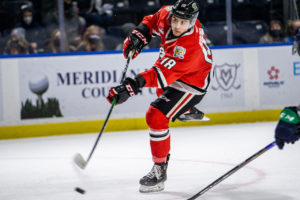
The other thing I would say is interesting to learn from Seattle, but what I’m very cognizant of is that this isn’t Seattle. Portland will not be Seattle. It doesn’t want to be Seattle. It has its own identity. What we are really focusing on is how we can develop our own Portland identity. We are tapping into the local businesses that are here and help promote that within the community in whatever we do. We will do whatever we have to do to help with the overall sports landscape.
I want to drive home though, we are not trying to be anything but Portland’s team.”
What is your three to five year plan for this organization:
“I see (the organization) staying the same if not getting better from the hockey side, and that’s a good thing. We have the best hockey staff in all of junior hockey on that side of it. Continuing to have that expectation that we are going to win, be competitive, develop hockey players, develop young men with life skills, and keep our education program going. I want to take what is already a great thing and certainly build it up better if we can.
One of the challenges we have is college hockey has become much, much, much more competitive to us and we are competing head-to-head, so we need to provide a similar if not better experience than what these guys are going to get at Michigan, Wisconsin, Minnesota, or Denver, or other places like that. That goes back to developing better. We’ve got the coaches, but do we have the facilities? Do we have the weight rooms, the training facilities, the locker rooms, and other things like that. So we are working with the city and working with the Rose Garden about how we build that side out.
Having fans back is so important. Time and time again what a difference it makes if there are 2,000 people in the stands or 7,000 people. From my standpoint, what would I love to see five years from now, I would love to see us on a similar trajectory on the development side putting three to five players into the NHL, developing these guys, and 100% college educated kids coming out of our WHL scholarship program. I would also like to see a renovated VMC or Glass Palace so that we get more comfortable seats with cup holders, fryers, and other things that we can provide a state-of-the art experience for our fans. I would then like us to see sellouts so instead of the 3,000, 4,000, 5,000 average fans a night, can we get it to the 8,000, 9,000, or 10,000 attendance in a renovated building. That will require us to make it worthwhile for that many fans to come out. Worthwhile from a fan experience but also in terms of the product on the ice. I want a fan base that is rejuvenated and is excited about the team and the community the team is part of.
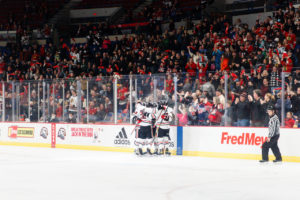
We are trying new things, some work and some don’t, but we have to be willing to try some new things and not just do all the old. Our season ticket holders are our base, our lifeblood of the company, so we don’t want to do anything that will alienate them as a group.
One of the things I’ve learned though as a sports team owner is I cannot, and will not, please everybody. Again, that was an unexpected thing for me coming in. We want to continue rewarding the Artis Moore’s of the world and the other fans who’ve been loyal to us for years and years, but we also want to bring in a younger crowd that is going to be there for the next 10, 20, or 30 years that will grow with us as an organization.
Again, I think that is the vibe of this city. It is a little bit of a younger sort of a bohemian type of town and we want to be part of that.”
Doing some of the things you mention will require an additional investment financially. How committed are you and the other owners in contributing financially to make these things happen:
“I’m committed, but my hands are somewhat tied.
We don’t own the building, we lease the building. That means we have to go through somebody to get every little thing approved. The city isn’t going to do anything that isn’t economically viable and neither are we. So we need to find the right way to do it is important. As far as I can tell, the city is committed to the building, so what can we do so we are pulling in the same direction. Hopefully people can see some of the little changes we already are making with branding and not just a bare wall.
One of the first few times I was here after we took over ownership I walked around the concourse and not anywhere here does it say Winterhawks. You could never tell that the Winterhawks were the primary tenant here. So my thought was, ‘What can we do about that and how do we bring out our history and share that with our fans.’ I mean, we have several Memorial Cups, we should put those on display so people can see those on that side of the building along with the Buckaroos and their memorabilia.
The other thing that we have that is unique is that we have an incredible alumni base. Can we continue to engage with them and support them so that once they leave us that they are still excited about their experience here? In the COVID season, when we didn’t have any fans, we went out and sold cutouts to put into the stands. We went out to a bunch of our alumni saying, ‘We want to put a cutout of you in the stands.’ We sold them to the alumni and used the money to help WAHA. We had several alumni buy a cutout and the proceeds didn’t go to us as an organization but to the educational fund for the boys. The response we had to that program was incredible. They of course wanted to give back. Getting additional financial support from the alumni is an untapped asset.
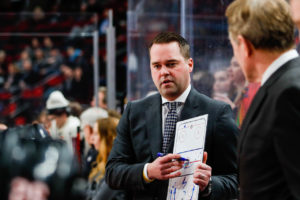
We have guys like Kyle Gustafson who is at the pro level and he goes to all the NHL arenas and he gets to talk to all the ex-Winterhawks. What a lot of people want to talk to him about is the Winterhawks. So we have an incredible asset that is sitting out there that should be more important to us. We have to nurture those relationships and it is something that is a big priority for us. Those guys are not going to come support this organization just because of who we are. We have to treat them right when they are here, after they are here, the city has to treat them right, and we want to earn that. It goes back to not being outhustled. I want to earn those relationships because no one is going to hand me anything.”
